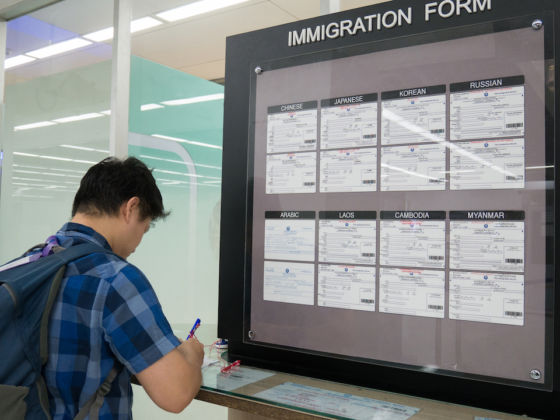“The name in your passport is wrong,” sighed the border protection agent at SFO, barely glancing at me with his bored eyes. The blood drained from my face, the feeling went out of my legs, and pure panic replaced the exhaustion I had just been feeling after sitting for ten hours on a trans-Pacific flight. “This is it,” I thought. “I’m going to die in airport jail because of a typo.”


Everything You Can Do to Make Going Through Customs Not Terrifying
Just as I was about to sink to the floor and let them drag me off to a dark cell, the agent brightened up and exclaimed, “It should be Wunderwoman!!” (my last name is Wunderman). I was barely able to force out a feeble “ha ha” before snatching my passport back and stepping on American soil.
If you’re like me, being in the presence of someone wielding even a modicum of authority can stir up feelings of guilt and fear. Nowhere is this more prevalent than at airport border protection and customs, either at home or abroad. I have an innate fear of the people who get to decide whether or not I’m worthy of entering an entire country: what if I answer their questions incorrectly? What if I accidentally packed something forbidden and that cute but fearsome beagle rats me out?
Creating an environment that stimulates excessive nervousness is one way of weeding out people who are genuinely attempting to break the law. Acknowledging that it’s not designed to be a pleasant experience, here are 7 tips to keep your stress level down while going through customs.
1. Don’t attempt to break the law.
If you actually have something to hide, like drugs or trafficked animals, (or chewing gum if you’re trying to go to Singapore), that can make it harder to keep your cool. Even if you make it past border protection, sniffer dogs could be waiting for you at customs — and they’re searching for fruit and veggies, too. It’s a lot easier to act not-nervous if you have nothing to be nervous about.
2. Research your destination’s prohibited items.
Every country has its own rules about what can and can’t be imported, and those things aren’t always intuitive. You’ll be less nervous knowing none of your stuff will turn out to be prohibited, and that you won’t have to give an awkward, forced apology for violating Australia’s biosecurity measures.
3. Have proof of your return ticket.
Border protection doesn’t just track you going into their country; they’re also making sure that you will leave within the timeframe of your visa. If they suspect you might be attempting to make your visit permanent, a return ticket (or bus/train/boat ticket out of the country) is a great tool for assuaging fears.
4. Be polite and tell the truth.
Whether you’re held up by a border or customs agent, it doesn’t do you any favors to get defensive or lie. Like most authority figures, they are trained to identify untruths, and getting pissy will only validate any suspicions they may have. Also, joking can make them think you have something to hide.
5. Travel with a pen.
This tip is way less intense than some of the others, but it’s an easy way to avoid unnecessary stress. Having your customs card filled out before deplaning means you won’t be scrambling to get it done when you could be queuing up to get your passport stamped.
6. Plan extra time to make your connecting flight.
I spent one very uncomfortable night in the Bogotá airport after the customs line proved prohibitively long, and I missed my next flight. Watching the minutes tick down was enough to make me freak out, which only made the border agents want to speak with me longer.
7. Just breathe.
The prospect of being “judged” by someone whose regular state of mind is suspicion can be understandably daunting to travelers with social anxiety. Reduce your heart rate with slow-breathing exercises, and remember that going through customs is a formality everyone has to go through. Likewise, the people scrutinizing you are just doing their job, and though it can feel personal at times, it isn’t.